 Petzlover
Petzlover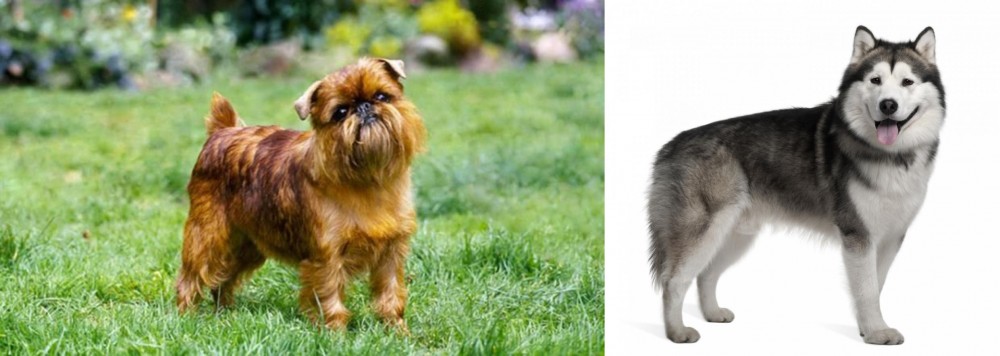 Belgian Griffon is originated from Belgium but Alaskan Malamute is originated from United States. Belgian Griffon may grow 44 cm / 17 inches shorter than Alaskan Malamute. Belgian Griffon may weigh 33 kg / 72 pounds lesser than Alaskan Malamute. Both Belgian Griffon and Alaskan Malamute has same life span. Belgian Griffon may have less litter size than Alaskan Malamute. Belgian Griffon requires Moderate Maintenance. But Alaskan Malamute requires High Maintenance
Belgian Griffon is originated from Belgium but Alaskan Malamute is originated from United States. Belgian Griffon may grow 44 cm / 17 inches shorter than Alaskan Malamute. Belgian Griffon may weigh 33 kg / 72 pounds lesser than Alaskan Malamute. Both Belgian Griffon and Alaskan Malamute has same life span. Belgian Griffon may have less litter size than Alaskan Malamute. Belgian Griffon requires Moderate Maintenance. But Alaskan Malamute requires High Maintenance
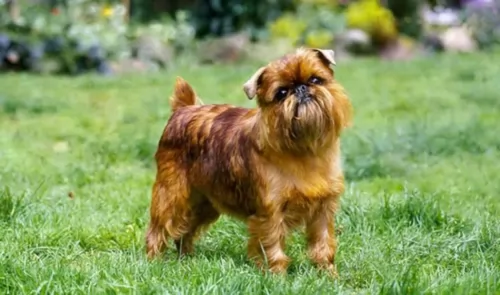 The Belgian Griffon isn’t your most attractive dog, but maybe its his quirky, gremlin looks that makes him such an adored pet for many. There are different varieties of Griffon, and the Belgian- and Brussels Griffon are one and the same. All small Belgian dogs have the same breed standards, with the Belgian having a rough coat The dog hails from Belguim and its ancestors were no doubt a mix of the Belgian street dog, the Stable Griffon and the Affenpinscher.
The Belgian Griffon isn’t your most attractive dog, but maybe its his quirky, gremlin looks that makes him such an adored pet for many. There are different varieties of Griffon, and the Belgian- and Brussels Griffon are one and the same. All small Belgian dogs have the same breed standards, with the Belgian having a rough coat The dog hails from Belguim and its ancestors were no doubt a mix of the Belgian street dog, the Stable Griffon and the Affenpinscher.
Later on in the 1800s, this combination was then crossed with the Pug, giving the dog the brachycephalic or flat faced look.
Unfortunately no written records were kept about the precise origin of this breed, but there is also the idea that the King Charles- and English Toy Spaniel were also involved in its development. These small dogs were bred to catch rats in the barns of European estates.
 Alaskan Malamute is one of the oldest breeds. Thousands of years ago, native people in the land between Alaska and Siberia. From the beginning, this breed is used as working dogs. Alaskan Malamute was a perfect dog for seal or bear hunting, and sledding supplies back home. During the gold rush, this breed became even more popular, and that popularity only grew over the years. They have been popular even during the war years. Army used them as sled dogs in the war.
Alaskan Malamute is one of the oldest breeds. Thousands of years ago, native people in the land between Alaska and Siberia. From the beginning, this breed is used as working dogs. Alaskan Malamute was a perfect dog for seal or bear hunting, and sledding supplies back home. During the gold rush, this breed became even more popular, and that popularity only grew over the years. They have been popular even during the war years. Army used them as sled dogs in the war.
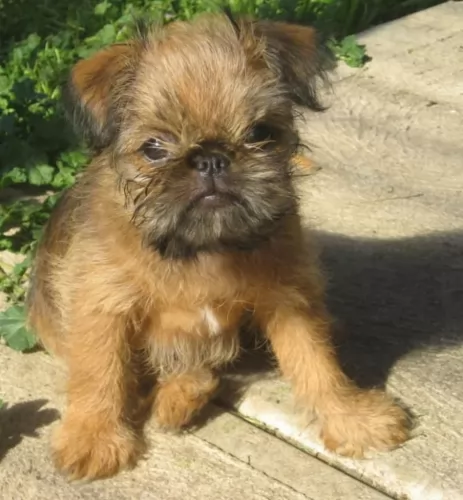 There are different variations of this dog to give it its distinctive look and size. This quaint looking little Griffon canine comes with two different coat types - soft or wiry. With the Belgian Griffon, his wiry coat of red, tan or black will need to be brushed at least twice a week. Shedding with this dog is seasonal.
There are different variations of this dog to give it its distinctive look and size. This quaint looking little Griffon canine comes with two different coat types - soft or wiry. With the Belgian Griffon, his wiry coat of red, tan or black will need to be brushed at least twice a week. Shedding with this dog is seasonal.
He has a compact, sturdy little body, and he trots around with attitude. With his sharp pointed ears and whiskers, he has been given the nickname ‘bearded dog’. His dark black eyes are alert. He is self-confident, intelligent and curious breed, a great family pet and good with children if he has grown up with them in the home. He is good with other pets. The fact that this is a small breed and that he doesn’t have excessive energy levels, means he is adaptable to city- and country living.
 Average weight of Alaskan Malamute variates from dog to dog, but male weights 37-39kg, while female weight is 32-34kg. An average height of the male is 62-64cm, while females are slightly smaller with a height of 56-58cm.
Average weight of Alaskan Malamute variates from dog to dog, but male weights 37-39kg, while female weight is 32-34kg. An average height of the male is 62-64cm, while females are slightly smaller with a height of 56-58cm.
A lifespan of this breed is 12-15, but if your dog is healthy with the balanced diet they tend to live much longer.
Litter Size of Alaskan Malamute is 4-8 puppies, but this depends on every dog.
Other Names for Alaskan Malamute are Mal and Mally
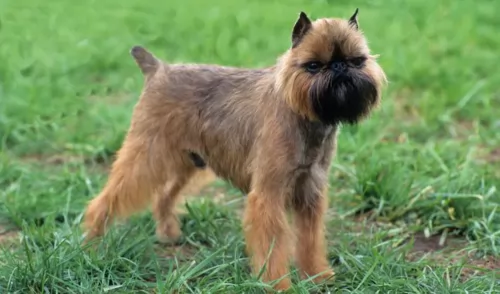 The Belgian Griffon is an affectionate pet and often establishes a strong bond with one member of the family. You’ll have your Griffon with you for about 15 years so make sure he is trained and a pleasure to have around.They are difficult to train, being somewhat stubborn so they are going to require patience. They’re sensitive too, and they won’t respond well to aggressive treatment.
The Belgian Griffon is an affectionate pet and often establishes a strong bond with one member of the family. You’ll have your Griffon with you for about 15 years so make sure he is trained and a pleasure to have around.They are difficult to train, being somewhat stubborn so they are going to require patience. They’re sensitive too, and they won’t respond well to aggressive treatment.
They’re much more indoor dogs than outdoor dogs because they’re also vulnerable to heat stroke. They just want to come indoors and be with their human family, and when you do that for them, they’ll become a wonderful friend and companion to you.
 Alaskan Malamutes are playful dogs that love running, playing and spending time outside with their family. They would greet anyone who comes to your house, no matter if they are first-time visitors. That makes them bad watchdogs. Since they are a pack breed, they love spending time with humans and they love being included in activities. Generally speaking, they are great with children. They have a lot of patience for the little ones in your family. If they are socialized properly, you will not have any problems with other animals. They love playing and spending time running around, so you will not have to worry. They might run towards cats, so you have to be careful. Alaskan Malamute is not very easy to train because they are very intelligent and stubborn breed. Not very recommendable for new owners. The best way to train your puppy is with patience, consistency and positive awarding. They do not like the old-fashioned way of punishment with beating included. Instead, rather try being positive and give your dog nice treat when the task is completed.
Alaskan Malamutes are playful dogs that love running, playing and spending time outside with their family. They would greet anyone who comes to your house, no matter if they are first-time visitors. That makes them bad watchdogs. Since they are a pack breed, they love spending time with humans and they love being included in activities. Generally speaking, they are great with children. They have a lot of patience for the little ones in your family. If they are socialized properly, you will not have any problems with other animals. They love playing and spending time running around, so you will not have to worry. They might run towards cats, so you have to be careful. Alaskan Malamute is not very easy to train because they are very intelligent and stubborn breed. Not very recommendable for new owners. The best way to train your puppy is with patience, consistency and positive awarding. They do not like the old-fashioned way of punishment with beating included. Instead, rather try being positive and give your dog nice treat when the task is completed.
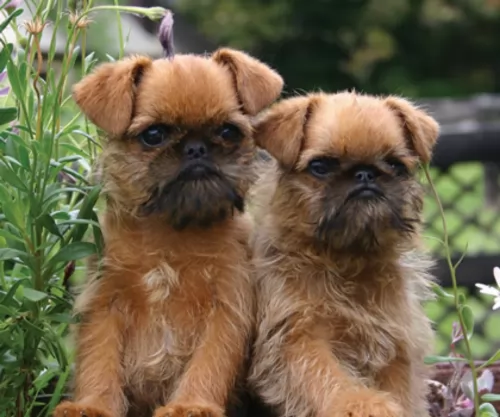 When you get your Griffon from a reputable breeder, you always have a better chance that he’ll be healthy. As it is, the Belgian Griffon has few hereditary health issues. However his dark eyes will have some genetic problems to contend with and he could suffer with progressive retinal atrophy. This is an illness which can lead to blindness
When you get your Griffon from a reputable breeder, you always have a better chance that he’ll be healthy. As it is, the Belgian Griffon has few hereditary health issues. However his dark eyes will have some genetic problems to contend with and he could suffer with progressive retinal atrophy. This is an illness which can lead to blindness
Syringomyelia – this is a neurological condition – an abnormality of the spinal cord – a disease which occurs more frequently in small breeds. It can cause your pet to endure a lot of pain.
Birthing Issues - these little dogs often have problems with giving birth, and a vet often has to intervene and perform a cesarean.
 Usually Alaskan Malamute is a very healthy breed. They do not have any major issues but like every other breed, they can develop some illness. Cataracta, Chondrodysplasia, and hip dysplasia are the most common health issues, but you shouldn’t be worried because they are not happening all the time. You must talk with people who are giving you the puppy to examine the genetics. With healthy breed, and regular vet checks you will have a happy and a healthy dog for a long time.
Usually Alaskan Malamute is a very healthy breed. They do not have any major issues but like every other breed, they can develop some illness. Cataracta, Chondrodysplasia, and hip dysplasia are the most common health issues, but you shouldn’t be worried because they are not happening all the time. You must talk with people who are giving you the puppy to examine the genetics. With healthy breed, and regular vet checks you will have a happy and a healthy dog for a long time.
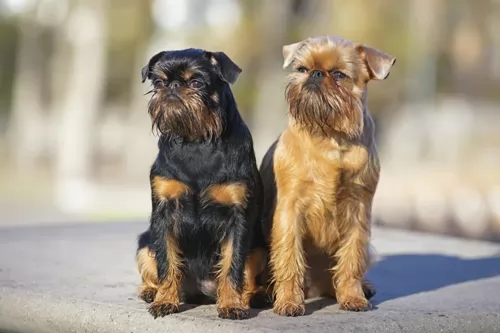 The Belgian Griffon will do well if you invest in high quality foods. You can make your own, but if you’re concerned about his health, it would be best to check what ingredients should go into his home-prepared meals to ensure he gets all the vitamins and minerals he needs.
The Belgian Griffon will do well if you invest in high quality foods. You can make your own, but if you’re concerned about his health, it would be best to check what ingredients should go into his home-prepared meals to ensure he gets all the vitamins and minerals he needs.
If you want to go with commercially manufactured dog foods, check with your vet about wet- and dry foods. Your vet will help with choosing a food appropriate to his size and age. Always ensure that there is clean, fresh water available to your pet.
Even though he is a small breed, he is fairly active and he will need his fair share of exercise like ball games and walks. Training and socialization are a must for him. You’ll notice that training isn’t particularly easy with this breed, and first time dog owners might not have the patience with him.
 Feeding of your Alaskan Malamute depends on various things. Metabolism, size of the dog, age, quality of the food, build and activity. So you have to understand your dog's needs. Overall, 4-5 cups of high-quality dry food would be enough. Of course, you can give your dog some fruit or vegetables too, as a treat. If your dog likes to spend most of the day on the couch, you don’t have to feed it as much as people who have more active dogs.
Feeding of your Alaskan Malamute depends on various things. Metabolism, size of the dog, age, quality of the food, build and activity. So you have to understand your dog's needs. Overall, 4-5 cups of high-quality dry food would be enough. Of course, you can give your dog some fruit or vegetables too, as a treat. If your dog likes to spend most of the day on the couch, you don’t have to feed it as much as people who have more active dogs.
Developing puppies need more food than an adult dog. They should eat 3-5 times per day, of high-quality puppy food. Puppy food contains more nutrient that will help to develop your dog into a healthy adult.
Grooming Alaskan Malamute may be little challenging. They have a lot of hair, so regular brushing is a must. 2-3 times a week at least. They shed a lot 2 times a year, and you will have to use vacuum-cleaner every day.